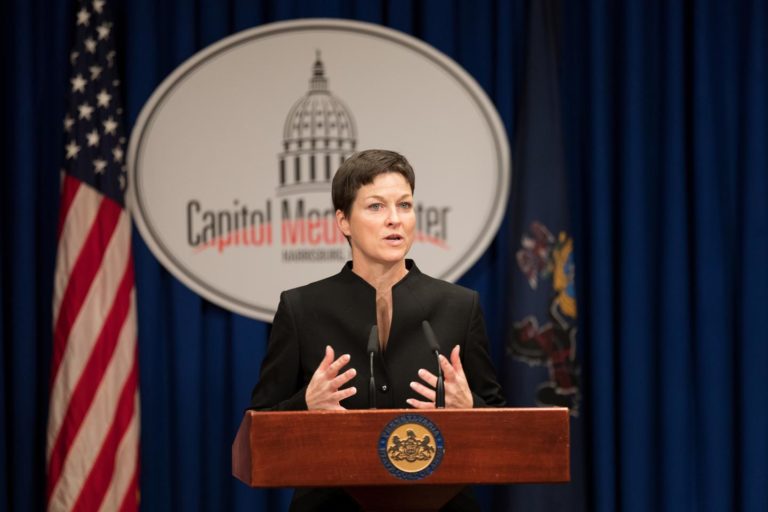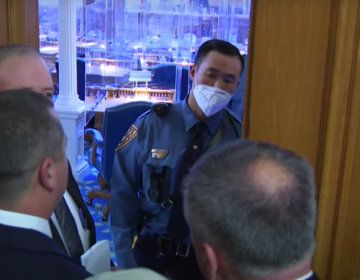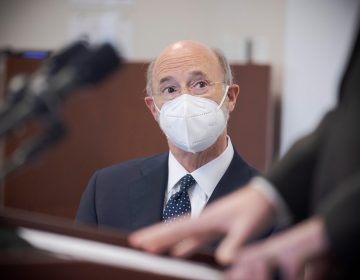Limited tech forces thousands of state workers to still report for work, despite their offices being closed
At least four caseworkers have tested positive for the coronavirus and one is hospitalized, said Steve Catanese, president of the union representing the workers.

(Commonwealth Media Services)
Spotlight PA is an independent, nonpartisan newsroom powered by The Philadelphia Inquirer in partnership with the Pittsburgh Post-Gazette and PennLive/Patriot-News. Sign up for our free weekly newsletter.
As the ranks of unemployed Pennsylvanians swell, the state’s 90-plus county assistance offices are still staffed by workers processing benefits for services like cash and food assistance, health care coverage, and family planning.
Though the offices are closed to the public, these workers, classified as “essential,” must show up because the state lacks the necessary technology and other measures to allow them to work from home.
At least four caseworkers have tested positive for the coronavirus and one is hospitalized, said Steve Catanese, president of the union representing the workers.
A spokesperson for the Department of Human Services said the agency is “trying to expand resources to facilitate telework for these employees,” with 94 telecommuting on a trial basis this week. The department employs 6,800 county assistance caseworkers, though it was unclear how many were in offices.
“It’s never been done for [county assistance office] staff before, so we need to make sure it’s feasible as we consider scaling it up,” the spokesperson, Ali Fogarty, said.
In 2016, the entire department had about 1,100 laptops, according to an internal IT document. Last week, the department requested $90,000 in emergency funds to buy HP laptops for county assistance office workers.
Catanese, of SEIU Local 668, said that is a positive development, but workers have not been told how those laptops will be distributed or if there will be enough to give all staff an equitable opportunity to work from home.
In the meantime, workers who remain in the offices are worried about dirty conditions, a lack of cleaning supplies, and crowded conditions that make it difficult to practice proper distancing techniques, Catanese said.
“Workers in county assistance offices are rightly concerned that by simply going to work, they may be a source of coronavirus spread,” Catanese said in a March 17 letter to department Secretary Teresa Miller. “And if just a handful of workers within our offices … test positive for the virus, the resulting impact on statewide public services could be catastrophic.”
At one office where a staff member tested positive for the coronavirus, Catanese said, employees were told the space had been thoroughly disinfected. But when staff passed a wipe over frequently touched and shared equipment — keyboards, printers, and even a vending machine — the wipes turned dark with grime.
He said some workers have sent him pictures of poorly cleaned offices, with dirt visible on a hand soap dispenser and puddles of slimy water in a bathroom. Fogarty said the agency is working with the Department of General Services and the owners of leased office spaces to ensure offices are cleaned regularly and a log is kept.
The agency is also ordering antibacterial soap, hand sanitizer, and cleaning supplies for each office, Fogarty said, and is supporting offices that want to purchase more supplies “if they become available.”
But orders for cleaning supplies “may be delayed due to supply chain constraints,” according to internal guidance from the Department of Human Services seen by Spotlight PA.
In late March, the department closed three Philadelphia offices for additional cleaning after the union said workers at some locations tested positive for COVID-19. Last week, the department sent each county assistance office in Philadelphia five bottles of hand sanitizer, Catanese said. Every office in the city has at least 50 workers, and several have more than 100.
“Philadelphia is a priority, and the best they can do is five 8-ounce bottles for every office,” he said.
As for other protective equipment, like masks or gloves, the state is not providing welfare workers with them unless those workers open mail or used similar supplies before the coronavirus pandemic began.
The Department of Human Services did ask the state for emergency funds — $215,000 — to purchase 200,000 N95 masks. Those are slated for staff and patients at state-run hospitals, residential centers, and for youth in the juvenile justice system.
Fogarty said the department distributed one cloth mask to each county assistance office worker over the weekend, as Gov. Tom Wolf advised everyone to wear a mask when out in public.
Catanese said moving to telework needs to happen as quickly as possible.
“We’ve indicated we’d be willing to work out situations to use most equipment available, including workers’ personal devices,” he said. “[I]f there’s any possibility of telework for all workers, it needs to happen now.”
 100% ESSENTIAL: Spotlight PA provides its journalism at no cost to newsrooms across the state as a public good to keep our communities informed and thriving. If you value this service, please give a gift today at spotlightpa.org/donate.
100% ESSENTIAL: Spotlight PA provides its journalism at no cost to newsrooms across the state as a public good to keep our communities informed and thriving. If you value this service, please give a gift today at spotlightpa.org/donate.
WHYY is your source for fact-based, in-depth journalism and information. As a nonprofit organization, we rely on financial support from readers like you. Please give today.


![CoronavirusPandemic_1024x512[1]](https://whyy.org/wp-content/uploads/2020/03/CoronavirusPandemic_1024x5121-300x150.jpg)


